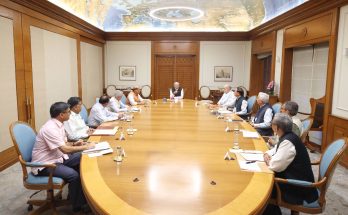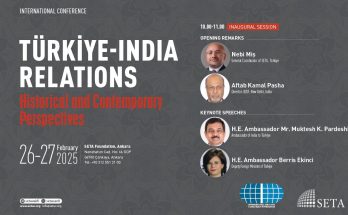 The talk on India’s participation at the Nuclear Suppliers Group (NSG) has initiated a discourse on the future of the Group, with particular reference to the Group’s relationship with the Nuclear Non-Proliferation Treaty (NPT). Those opposing India’s entry to the global nuclear export control regime argue that letting India join the NSG would mean a decoupling of the NPT and the NSG membership. It is also said that by including a non-NPT state, the NSG would undermine the legitimacy of the NPT. These arguments essentially stem from the belief that the NSG was established to support and complement the NPT in its goal of nuclear non-proliferation.
The talk on India’s participation at the Nuclear Suppliers Group (NSG) has initiated a discourse on the future of the Group, with particular reference to the Group’s relationship with the Nuclear Non-Proliferation Treaty (NPT). Those opposing India’s entry to the global nuclear export control regime argue that letting India join the NSG would mean a decoupling of the NPT and the NSG membership. It is also said that by including a non-NPT state, the NSG would undermine the legitimacy of the NPT. These arguments essentially stem from the belief that the NSG was established to support and complement the NPT in its goal of nuclear non-proliferation.
India, on this front, is not considered by some nations and global nuclear experts as like-minded as it continues to remain outside the NPT. There are two important factors, however, which require careful examination before any judgement is made on either the like-mindedness of India or India’s participation at the NSG. The first aspect to be examined is that of a direct proportionality which is assumed to exist between NPT-membership and like-mindedness of a country on nuclear non-proliferation. The second factor which needs to be studied is the relationship between the NSG and the NPT memberships.
The necessity of like-mindedness is understandably critical considering that the NSG functions on consensus and including countries which do not adhere to the common principles and norms of non-proliferation could diminish the efficiency of the Group significantly. But there appears to be an assumption made in this argument (against India’s participation) that NPT-membership and like-mindedness on nuclear non-proliferation are directly proportional to each other. History, however, proves that the NSG has, in fact, faced situations when some of its participating governments (PGs), that were also party to the NPT, did not show the like-mindedness which is expected to be demonstrated. For instance, for over 13 years after the NSG meeting of 1977 in London, the NSG PGs did not meet to discuss the proposal of creating the requirement of full-scope safeguards at the recipient state a condition for export of nuclear materials, equipment and technologies that were covered in the NSG’s trigger list. Though the Guidelines as established in 1977 were not violated by any of its PGs and the Group also expanded with 12 new countries joining the Group in that period, due to commercial interests of some of the PGs, as argued by Ambassador Tadeusz Strulak, Chairman of the NSG in 1992, the PGs did not meet. This absence of like-mindedness also resulted in the absence of expansion and upgradation of the NSG trigger list (of sensitive nuclear and related materials, equipments and technologies) which allowed some NPT nations, in particular Iraq, to acquire dual-use equipment to run a clandestine nuclear programme. It was only at the end of the Gulf War, that the NSG PGs agreed to meet and discuss the expansion of the trigger list to include nuclear related dual-use items.
Another and a more recent example is that of China and its export of two additional nuclear reactors to Pakistan at Chashma-3 and -4. China claimed that the export of the reactors is grandfathered by an agreement made between China and Pakistan in the early 1990s, much before 2004 when China joined the Group. But the fact remains that China did not disclose its plans of exporting new reactors to the NSG PGs in 2004 which it was required to notify. On the contrary, it had assured the NSG that it will not export any other reactors than Chashma -1 and -2. China’s decision to export reactors, without acquiring formal exemption for Pakistan is a clear violation of the NSG Guidelines and it threatens the credibility and the legitimacy of the Group.
These two examples illustrate the argument that NPT membership does not necessarily reflect the like-mindedness of a country on nuclear non-proliferation. The cases of Iraq (in the early 1990s), Iran and North Korea further consolidate the validity of this argument. While being signatories to the NPT, they have either run clandestine nuclear programme or have left the Treaty and developed and tested weaponised nuclear devices. Though the reasons could vary, such instances showcase that NPT membership alone cannot determine the path a nation takes in so far as nuclear proliferation is concerned.
Courtesy: ORF
Author Profile
- India Writes Network (www.indiawrites.org) is an emerging think tank and a media-publishing company focused on international affairs & the India Story. Centre for Global India Insights is the research arm of India Writes Network. To subscribe to India and the World, write to editor@indiawrites.org. A venture of TGII Media Private Limited, a leading media, publishing and consultancy company, IWN has carved a niche for balanced and exhaustive reporting and analysis of international affairs. Eminent personalities, politicians, diplomats, authors, strategy gurus and news-makers have contributed to India Writes Network, as also “India and the World,” a magazine focused on global affairs.
Latest entries
 India and the WorldJune 26, 2025Operation Sindoor: India Sheds Restraint, Rediscovers Utility of Force
India and the WorldJune 26, 2025Operation Sindoor: India Sheds Restraint, Rediscovers Utility of Force India and the WorldJune 23, 2025BRICS summit in Rio to focus on Global South, local currency trade
India and the WorldJune 23, 2025BRICS summit in Rio to focus on Global South, local currency trade Africa InsightsJune 11, 2025New Opportunities in India-Japan Cooperation in Africa
Africa InsightsJune 11, 2025New Opportunities in India-Japan Cooperation in Africa India and the WorldMay 23, 2025Post-Operation Sindoor, India reminds Turkey, China of concerns and sensitivities
India and the WorldMay 23, 2025Post-Operation Sindoor, India reminds Turkey, China of concerns and sensitivities







